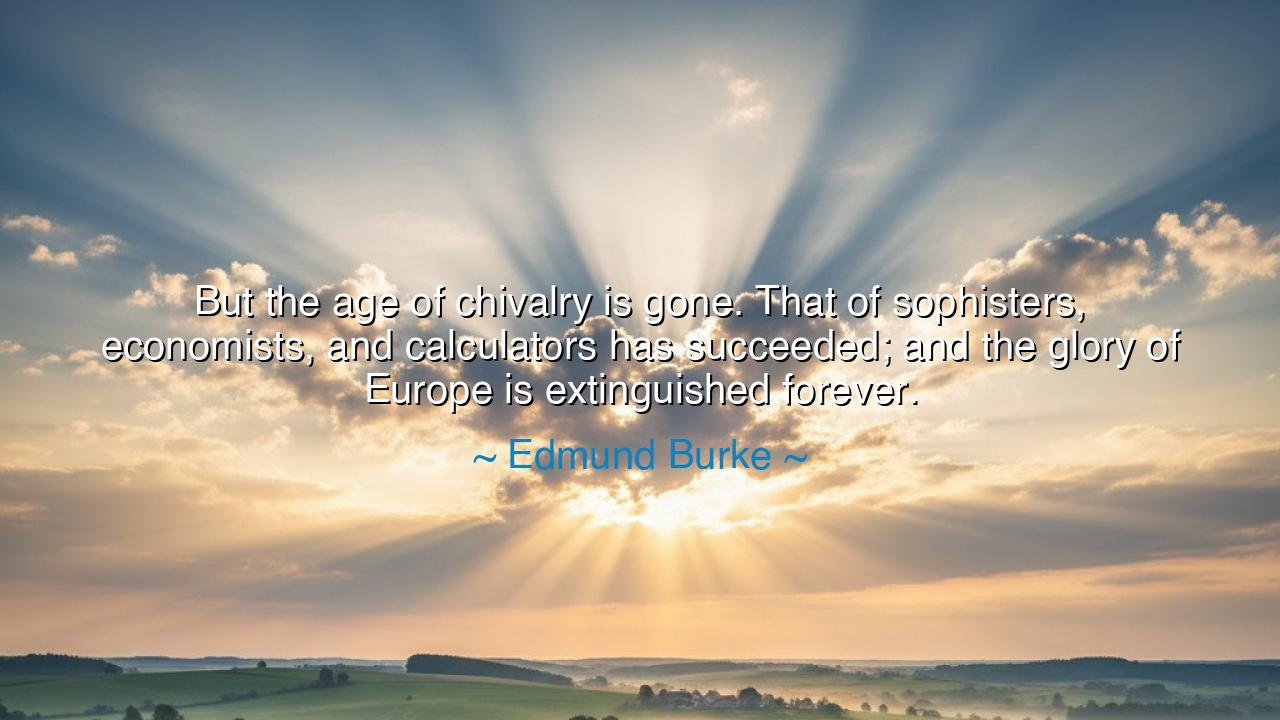
But the age of chivalry is gone. That of sophisters, economists
But the age of chivalry is gone. That of sophisters, economists, and calculators has succeeded; and the glory of Europe is extinguished forever.






The words of Edmund Burke — “But the age of chivalry is gone. That of sophisters, economists, and calculators has succeeded; and the glory of Europe is extinguished forever.” — resound like the tolling of a great bell at twilight. They are not merely the lament of a man mourning a vanished world, but the cry of a soul who beheld the spirit of nobility fading into dust. In this single utterance, Burke marked the passing of an age of honor, and the rise of an age governed by cold reason, profit, and self-interest. Where once the heart ruled with courage and faith, the mind began to measure and dissect, to trade virtue for advantage, and beauty for efficiency.
In the Age of Chivalry, men were bound not by contracts but by oaths; not by gold, but by duty and reverence. The knight knelt not before wealth, but before the divine call of conscience. He stood as protector of the weak, defender of the sacred, servant of the good. His was a world where glory and sacrifice mingled, where one’s worth was measured not by calculation but by character. But Burke saw the turning tide — the French Revolution had broken that ancient order. The world of faith and fealty gave way to a world of theories, abstractions, and the restless counting of gain. The “sophisters, economists, and calculators” were not evil men, but their tools were dry, and their hearts were cold. They measured the body of society but forgot its soul.
Behold how the change unfolded! Burke watched, as the heads of kings rolled beneath the guillotine, and the voice of reason became a tyrant more dreadful than any crown. He saw that in destroying the throne, men also shattered the altar — and when the sacred is gone, the profane fills its place. The glory of Europe, to him, was not its empires nor its armies, but its spirit of honor, its poetry of life, its belief in the divine dignity of mankind. When that spirit fell, Burke felt as though a star had been plucked from the sky, leaving the continent in moral twilight.
Let us recall a tale — that of Joan of Arc, the Maid of Orléans. In her courage and faith, she embodied the dying flame of that chivalric age. A peasant girl, armed with nothing but conviction, she stood against nations and kings. Her vision was not born of reasoned discourse but of sacred inspiration. Yet, when she was betrayed and condemned by the “calculators” of her time — those who weighed politics over purity — the world witnessed the triumph of expedience over virtue. So too did Burke see this spirit multiplied in his own century: when ideals are traded for power, the noble for the useful, civilization itself begins to unravel.
The lesson Burke sought to teach is eternal: a society cannot live by reason alone. The intellect is a fine instrument, but it is not a compass. A nation may prosper in commerce, yet perish in spirit. Without reverence, beauty, and moral imagination, even the brightest civilization becomes hollow. The glory of Europe that Burke mourned was not a matter of splendor or conquest — it was the radiance of a culture that believed in something higher than itself.
In our own age, we too are tempted by the same idols — the idols of numbers, analysis, and control. We weigh everything, yet value nothing. We dissect truth into data, and call the fragments wisdom. But if we forget to feel awe, to honor the sacred in life — whether in God, in nature, or in human dignity — we too shall walk in darkness. For a world without chivalry, in spirit if not in form, becomes a world without soul.
Therefore, let each man and woman strive to rekindle that ancient flame within themselves. Let them live with honor in their dealings, reverence in their words, and courage in their hearts. Protect what is fragile, uphold what is right, and give without thought of return. Be not mere calculators of advantage, but guardians of beauty, bearers of light. For the age of chivalry is never truly gone — it sleeps, waiting to rise again in those who dare to live with greatness of heart.
Thus remember, O reader: when you choose between what is right and what is profitable, between what is noble and what is convenient — you stand at the crossroads of ages. Choose well, and you may yet restore a glimmer of that lost glory of Europe, not in empires, but in the quiet splendor of the human soul.






AAdministratorAdministrator
Welcome, honored guests. Please leave a comment, we will respond soon